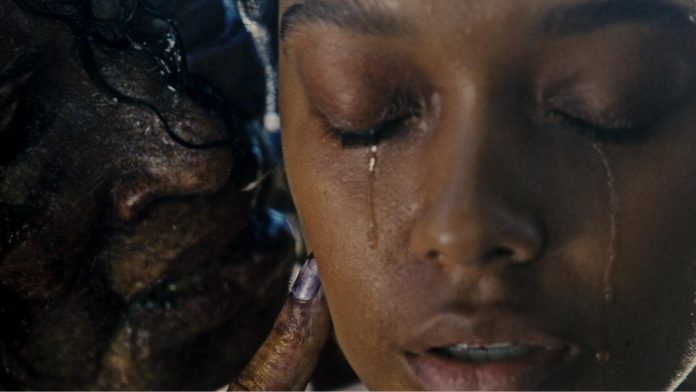When Danny and Michael Philippou‘s Australian horror film Talk to Me premiered at this year’s Sundance Film Festival in January, it seemingly came out of nowhere, sparking a bidding war that was won by A24. The two brothers had already made a name for themselves, at least in Australia, from the short films on their RackaRacka YouTube channel, though Talk to Me was quite different and far more disturbing than their earlier work.
Talk to Me stars Sophie Wilde as Mia, a teenager whose mother died under mysterious circumstances. When Mia gets caught up in a local party game involving a mummified hand that seemingly allows those who grasp it to interact with and become conduits for the dead, it leads to her best friend’s younger brother (Joe Bird) becoming possessed, which has deadly consequences.
The movie is quite an effective calling card for the Philippou brothers, as it scared the hell out of festival audiences at Sundance, and it’s far more shocking than most horror movies being produced in the States, where I suspect fans of recent hits such as Smile or Barbarian will eat this one up, too.
Above the Line spoke with the Philippous a few weeks back for the following interview, in which their lively back-and-forth banter reminded me of the first time I spoke to another pair of Australian filmmakers, James Wan and Leigh Whannell, when they brought their horror movie Saw to this country in 2004. I suspect they’ll follow a similarly charmed path in Hollywood…
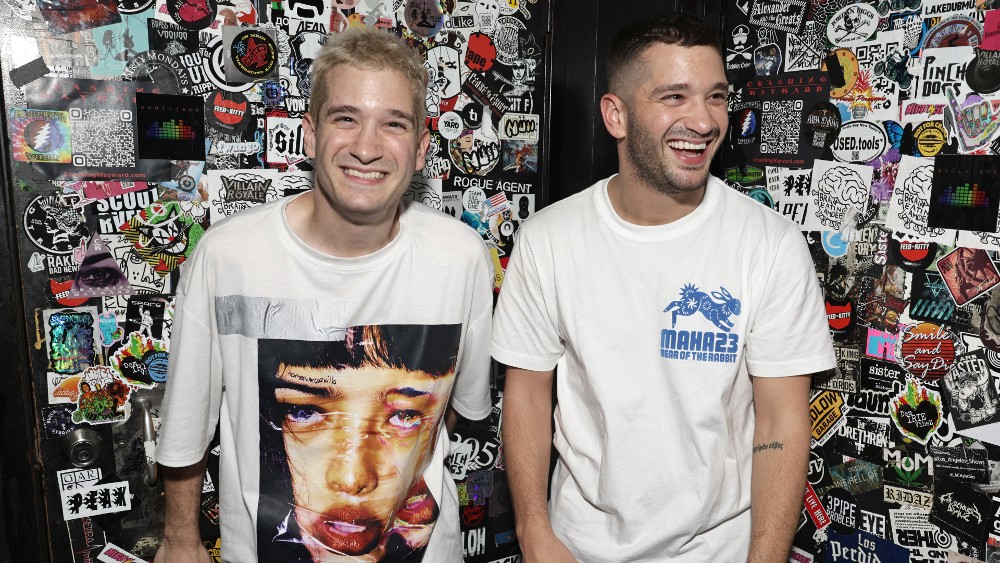
Above the Line: I saw the movie at Sundance, though virtually, and then saw it again in a screening room, which was so much better — seeing it in that environment with other people and feeding off their reactions. I didn’t know about RackaRacka until I knew I was talking to you guys, but you’ve been making these video shorts for about 10 years now. Was Talk to Me something you’d been building up to and just waiting for the right time to make?
Danny Philippou: We actually had been doing it way longer than that as well. We’d started when we were about nine, and we’d made stuff all the way through our teenage years until we made Racka Racka. We’ve been doing it for so long, just obsessed with the idea of making anything. We made so much stuff as kids, and we were just constantly working on multiple different projects.
I think that YouTube went through a thing where it just started being really, really advertiser-friendly, so the room for more mature content or violent content really started to thin out, and our content was getting removed or demonetized. We were looking for another way to express ourselves creatively, and I turned back to what I was doing before I did YouTube, which was writing, and back to what we really wanted to get into before, which was [making] feature films. It was like a blessing in disguise.
Michael Philippou: Feature film and television, that was always our goal. The YouTube stuff, we kind of got swept up in, and fast-forward to seeing results progress straightaway [via] engagement, subscribers. So you see growth, and you get that instant gratification; the film stuff takes a lot longer.
It was always something that we were working on, but always in the background of the YouTube stuff, because the YouTube stuff was so fast, and it was so much fun. It helped us when it was like, ‘Okay, it’s not really a thing now, the YouTube stuff, [as it forced us] to go back to what we really wanted to do, [which] was feature film and television. ‘A blessing in disguise,’ as Danny said.
ATL: Before we get further into Talk to Me, how have you not been sued by McDonald’s for those crazy Ronald McDonald videos? Have you just been flying under the radar, and they never knew about them?
Danny: It was a big discussion. We got banned from every single McDonald’s in the state that we were in, so we went out a lot further, because we’d shot there and stuff, and they were angry about it. I don’t know if there was a meeting with McDonald’s, but they ultimately just decided to let it go. They didn’t really care. I guess we were tapping into an audience they couldn’t tap into. It was marketing, in a weird way.
Michael: Yeah, also because we once did a [crowdsharing] thing, and we had that character, and they said it was protected under parity law. The McDonald’s mascot, it’s like taking this family-friendly thing and turning it into a monster. That’s the idea of the character, and it grew a cult following, so we just said, ‘Let’s put Ronald in that. What will happen if Ronald is that character?’ And we just put him in everything, because it was something the audience really loved, so we ran with it.
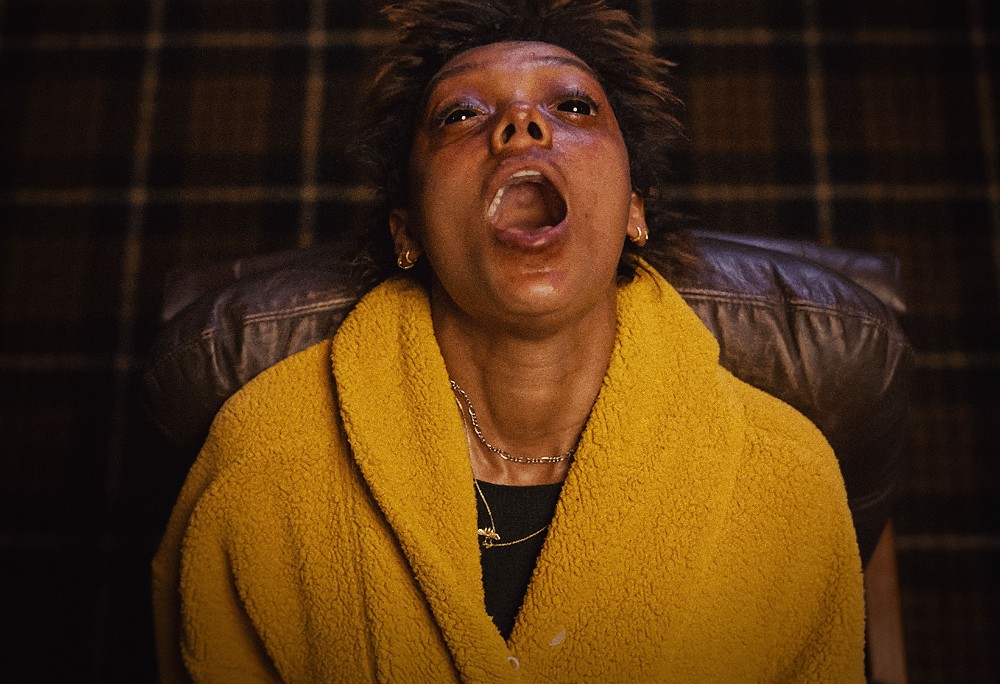
ATL: Australia has such a great history with horror that goes back decades, long before The Babadook. Everyone seems to put their deepest fears into their movies Down Under, so tell me where the idea of Talk to Me first originated.
Danny: It was multiple parts of inspiration. One of the big ones was these neighbors that we watched grow up and we helped babysit — it was three boys — one of them was experimenting with drugs for the first time, and he fell to the floor, and he started having a really negative reaction. He was convulsing on the floor, and the friends he was with were filming him and laughing at it. That image always stuck with me and scared me.
That was one of the main inspirations, and then another thing was a short film that Daley Pearson had written that he sent to me to look at and then I did a pass on that. It was sort of like, “Are kids using demons as party drugs?” That concept was so fun to me, and I rewrote it, and I just couldn’t stop writing. I handed it off to my co-writer, Bill Hinzman, and we just started collaborating and formulating, putting it together.
ATL: You had done quite a few horror shorts — I think I saw one involving a zombie — but was horror a genre you’ve wanted to explore more?
Michael: We’ve been fascinated by horror since we were little kids watching stuff you’re not supposed to watch. We were obsessed with Evil Dead, and then, there was a lady that used to take us to the cinemas when we were just kids — she was taking us to all the adult films. I remember getting taken to see Texas Chainsaw Massacre, the 2003 version, and I actually had to leave the cinema because I felt sick. And she was like, ‘Oh, you’re gonna be fine,’ but then, Leatherface was cutting someone up, and I remember it sticking with me. I think we all have those moments in childhood, these films that scar us.
It was something that fascinated us. ‘Why does this work? Why is this scary?’ and we try and recreate that, shot for shot, and try to make it work, which it never did. That was the progress. We wanted to make something that was scary, and then, when you dive into the horror world, we started appreciating horror that didn’t rely just on jump scares to be scary. Just thematically, it’s scary. The story is scary. So when you’re watching it, it’s just an uneasy feeling. I think that’s some of the best horror, so that’s stuff that we wanted to create as well, something that isn’t just relying on jump scares, something underneath that that is genuinely scary.
Danny: It was always that thing of, our Mum would never let us watch over a certain rating, like, anything over PG, she would never let us watch [it], and our Dad would. It was always this thrill of watching something you weren’t meant to, and that was just like a rite of passage or a part of childhood — to be scared by something.
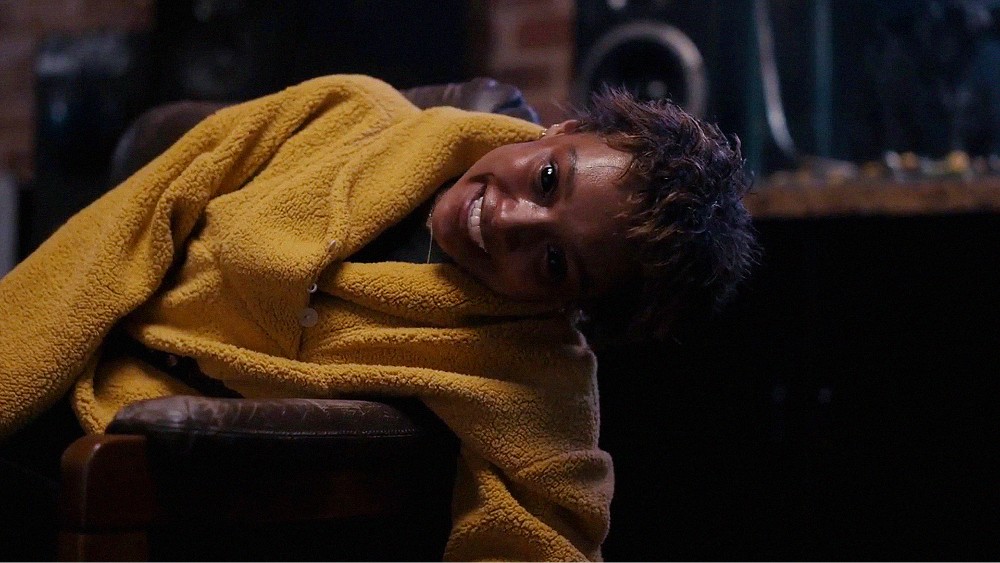
ATL: Let’s talk about the cast. Obviously, Sophie Wilde is amazing as Mia, but you have this great young ensemble, and I’m not sure how experienced any of them were before making this movie. Did you just go through a huge audition process to put this cast together, including finding Sophie?
Danny: The casting process was super integral, and we just had to find people [who] felt as authentic to the characters as possible. We knew once we found them, and it was always exciting to find the cast members and know straightaway that we found them. It was super integral, and then, once we found Sophie, it was heaven. We lost money out of the budget by casting her, but it was so worth it because she’s so incredible.
ATL: Had she done a lot before this?
Danny: I’m not 100 percent sure, but I think she’d done two or three projects before this. She was in two TV shows, like, a local one and one in London, and then maybe a film.
Michael: Anyone [who] gets the privilege of working with her will see just how talented she is. When we saw her audition, it was like, ‘Oh, my God, this is unbelievable.’ And she was unbelievable on set every day. And in the edit, there are no bad takes of Sophie. She’s just so amazing, and you feel it through the screen as well. She carries such a presence, and she’s so special that we felt very lucky that we were able to get her. She’s destined to be a major star, and, like, we got her early, which is awesome. To experience this with her, and then get distribution by A24 and get into Sundance, it was our first experience doing that, and then, hers as well. It was amazing to share that experience.
ATL: Did you have her sign a contract to do multiple movies or are you going to have to renegotiate with her to do any sequels?
Michael: We’d love to use her for everything. When I think of our next film, I’m like, ‘No Sophie? Maaannn.’ Whoever the lead is, they’ve got big boots to fill, because Sophie was just unbelievable. We’ll renegotiate — she deserves to get paid everything because she’s that talented.

ATL: What about casting the younger brother of Mia’s friend, who is so key to the story being told?
Danny: Joe [Bird] was a last-minute thing. We were casting and casting and casting, and we very luckily found him at the very last second. There were some really good performances, but he just felt really natural to our world. A lot of kids were able to really nail the drama aspects of the character, but they weren’t right for the possession aspects. Their performances weren’t as strong, but then Joe was just incredible on all fronts.
Michael: Because there was COVID and a bit of hiatus between 2020 and 2022, Joe had actually auditioned earlier on. It was when he was 12, and then there was an audition when he was 14. It was like two different people because he was a little kid, and then he was a teenager. When we saw the audition a second time, [it was like], ‘Oh, he auditioned before.’ ‘Did he???’ And then you look at the auditions, and he’s a completely different person.
Danny: We didn’t even recognize him! It was so weird.
Michael: We completely didn’t recognize him; he had grown that much in those two years.
ATL: He also deals with a lot of the makeup stuff. Did you have special makeup FX people you had worked with before?
Danny: The makeup effects group, we hadn’t worked with before — it was our first time working with them — but they were so collaborative, and they were so accommodating to Joe, and that made it a really comfortable experience for him. The comfortability can only go so far because he’s in makeup for hours and hours, [but] he was such a trooper, and he was so keen to be there. He didn’t complain once. He was awesome, he really went for it, and his acting in the possession scenes is remarkable.
ATL: Have you two generally been shooting everything in Australia over the years, or did you say that you came here and shot some stuff here as well?
Danny: We’ve shot some commercials in Norway once, but yeah, everything in Australia, and we’ve done some YouTube stuff here in the States, but I want to bring all of our productions back to Australia. I’d love that. We love the crew that we got and the people [who] we work with. I’d love to bring all of our productions back home.
Michael: Yeah, finding a crew that you work well with and [who] want to be there is so integral because making a film is already such a difficult process and stressful [enough]. Having people [who] want to be there and are passionate about it and finding those people for our film crews, it’s tough. I’ve heard stories of people [who] just never find those people at all, whether it be producers or DPs or even the other jobs, like catering and grip and things like that.
These are people we’ve worked with in the past [who] we really vibe with [and] just love having on set. It’s like this family on set. I’d love to be able to continue that in the future as well, but we’re not opposed to shooting in America or anywhere else. But we’d be much more comfortable doing it with the crew that we [used] from Talk to Me.
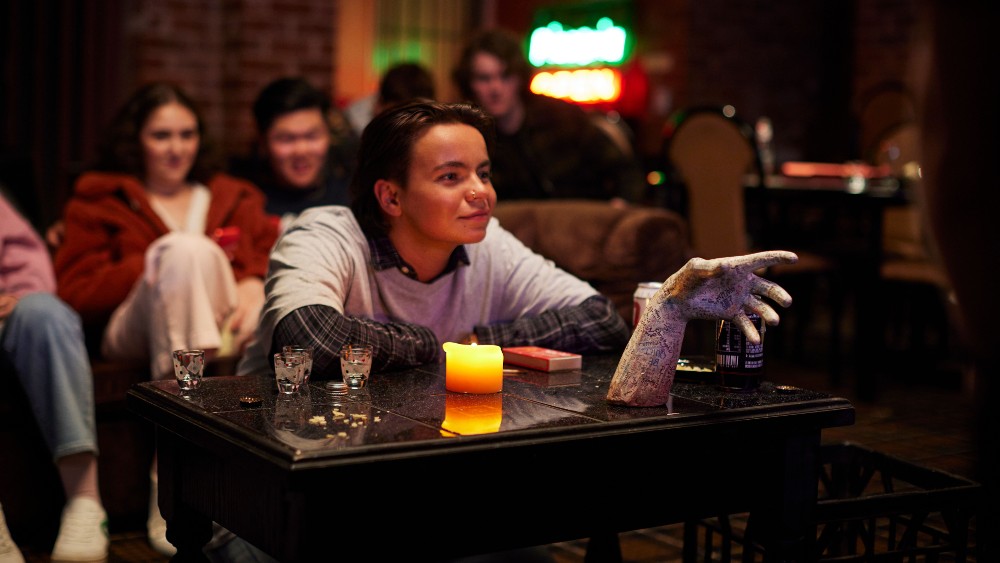
ATL: Also, when you come to America, you have to deal with the unions and other craziness that can make things a lot more difficult and a lot less fun to make movies or a television show.
Michael: That’s why, when you have good producers, they take care of it. That’s the thing — with YouTube, say we wanted to go film at a train station, we just pick up a camera and go film at the train station. You want to do that on a film, that’s 100 different permissions and police, and it’s a lot bigger. In film, it’s just a lot bigger process, and it’s a lot more expensive as well.
ATL: Before you go, I want to ask about the sound design and music. There’s sound design that might be music and music that might be sound design, and it creates such an amazing vibe. Were these people you had worked with before, people you knew? I wasn’t really familiar with any of the names…
Danny: [The] sound design was Emma Bortignon. It was always Christmas when she would do passes and deliver us something. We’d give notes, and she’d go away, and it was always exciting to hear that soundscape build. Michael was super hands-on with audio down to the decibels. He was in the weeds with her doing that as well.
Michael: Annoyingly so. Sound and music are so important to me. I was really involved in that process, almost to an annoying amount. I can tell the difference between one or two DB. ‘Could we have that one frame to the left?’ [and] things like that. Emma created such a unique feel for the sound design for possessions and different moments where you feel it. Just with sound, you can feel the difference, which is amazing.
One of the biggest lessons from this film is knowing that in the future, I want to have time to have the music get started in preproduction, not at the end when the film is done. Because everyone [else] gets a lot of time, and then, at the end of the film, our music should have a certain amount of time to do it [too]. I want to start that process earlier and work with the composer to really create the world.
[But] we found the sound in the end. It was very difficult, the music, but we got there in the end. Cornel [Wilczek] on that was amazing; it’s such an amazing-sounding film. I can’t wait for the next film to start earlier and find the sound early in the process, to bring it through while we’re shooting and editing and have it more integral to the whole thing, as opposed to just at the end.
Talk to Me is now playing in theaters nationwide courtesy of A24.


